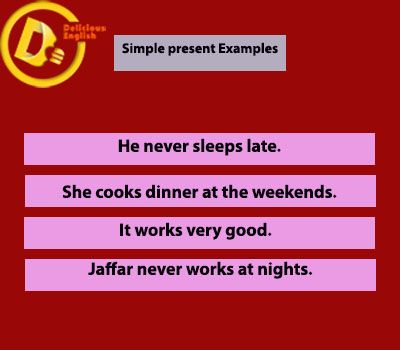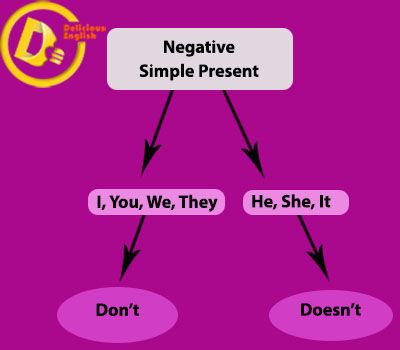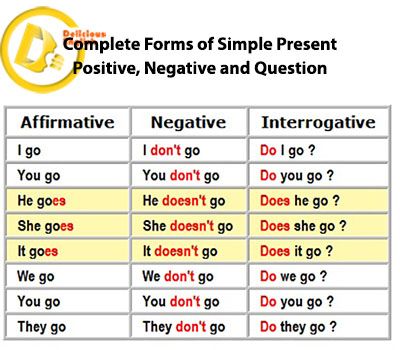02174391370

simple present video Added
After learning Greetings, Pronouns ( I, You He…) and To be verbs (am, is , are), English learners must practice Simple present
Simple present I think is the first tense which you must learn, because using simple present is very common in English language. Also, Simple present is the basic grammar, by learning it completely, you will pave the way to learn other Tenses
Subject + Verb
It is very simple to make simple present tense. The only thing which you need is a subject and a verb
Every sentence usually needs a subject
Subjects
Every simple present tense has a verb for example
Work, Study, Sleep, Read, Write
|
I |
Go |
|
You |
Go |
| We |
Go |
| You |
Go |
| They |
Go |
|
He |
Goes |
|
She |
Goes |
|
It |
Goes |
Note: for He, She, It we add S or ES to the verbs
Note: if the subject is a name it is like the pronouns. For Example, Ali, Ghazal, Asghar or The dog or the Cat like pronouns
Ali Goes
Ghazal Goes
Asghar Goes
The dog Goes
The cat Goes

|
I go to school every day |
We go to school every day |
|
You go to school every day |
You go to school every day |
| He goes to school every day |
They go to school every day |
|
She goes to school every day |
|
|
It goes to school every day |
Subject + Don’t / Doesn’t + Verb

|
I don’t go to school every day |
We don’t go to school every day |
|
You don’t go to school every day |
You don’t go to school every day |
| He doesn’t go to school every day |
They don’t go to school every day |
|
She doesn’t go to school every day |
|
|
It doesn’t go to school every day |
?Do/Does+ Subject + Verb
|
?Do I go to school every day |
?Do we go to school every day |
|
?Do you go to school every day |
?Do you go to school every day |
|
?Does he go to school every day |
?Do they go to school every day |
|
?Does she go to school every day |
|
|
?Does it go to school every day |
Note: when we use Does or doesn’t we must not use S or Es at the end of the verbs
He Doesn’t goes to school everyday
He doesn’t go to school every day

verbs ending in ‘SS’, ‘SH’, ‘CH’, ‘X’ and ‘O’ we should add ES to form the third person singular he, she it
|
I rush |
|
He rushes |
|
She rushes |
|
It rushes |
|
We rush |
|
They rush |
|
I watch |
|
He watches |
|
She watches |
|
It watches |
|
We watch |
|
They watch |
‘when before ‘Y’ there is a consonant we change the ‘Y’ into ‘I’ and add ‘es
|
Carry |
Copy |
Try |
|
I carry |
They copy |
We try |
|
She carries |
He copies |
She tries |
‘verbs ending in ‘Y’ following a ‘Vowel’ we add just ‘S
I stay
He stays
We obey
She obeys
grammar simple present when to use simple present by Delinglish.com
repeated events: we use adverbs of frequency like always, usually
I always get up early in the morning
Note: also it is habitual action in some grammatical books
He smokes cigarettes
General facts
I live in Tehran
Ice melts at 0 degree
. simple present can be used in newspaper headlines
MASS MURDERER ESCAPES
PEACE TALKS FAIL
dramatic narrative: describing the action of a play, opera. Commentators use simple present to describe the sports events
state verbs
|
Existence |
Be, exist |
|
Mental states |
Believe, doubt, know, realize, recognize, suppose, think, understand |
|
Wants and likes |
Want, like, love, hate, need, prefer |
|
Possession |
Belong, have/has, possess, own |
|
Senses |
Feel, smell, taste |
|
appearance |
Appear, look, seem |
She has a house
I do not believe in god
I think you are tired
in zero conditional and in first conditional
Zero: if you heat ice, it melts
First: if you give me 100$, I will but a DVD player